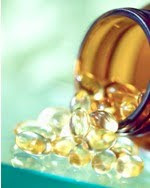 Interstitial cystitis patients often ask me about how various vitamin supplements can help them. The latest buzz in the media seems to be how a deficiency of vitamin D can affect chronic conditions like IC and related conditions.
Interstitial cystitis patients often ask me about how various vitamin supplements can help them. The latest buzz in the media seems to be how a deficiency of vitamin D can affect chronic conditions like IC and related conditions.Vitamin D is an essential nutrient, meaning that our bodies cannot manufacture it, therefore we need to get it from our food or outside sources. Unlike most essential nutrients, however, our bodies CAN make vitamin D if we are exposed to the sun’s ultraviolet rays for a minimum of 10 minutes a day. Although 10 minutes doesn’t seem like much, if a person doesn’t get much exposure in the winter and avoids sun in the summer by covering the body with clothes and sunscreen, you can see how quickly a low level of the vitamin can develop. People with IC or painful bladder syndrome can be more susceptible if the feel they are housebound and don't get outdoors as often as a healthier person.
How might a vitamin D deficiency affect someone with bladder pain? A true vitamin D deficiency in an adult would be evidenced by a softening of the bones called ‘osteomalacia.” This is actually very rare in the United States due to supplementation of the vitamin in a number of food products including most milk. What we are learning, however, is that a person does not need to be “deficient” in the classic sense of the word, but that Vitamin D levels can be very low contributing to a variety of common ailments, including autoimmune conditions, some cancers, and people with muscle disorders including pelvic floor dysfunction.
The problem with definitively trying to link Vitamin D to IC is that prevalence of low Vitamin D in the IC population is probably not much different than we are seeing in the general population, which is quite high regardless of any other disease process. If you do an internet search for “Prevalence of low Vitamin D,” you can see the many different studies that have compared Vitamin D to various diseases. It is actually staggering.
Rather than totally discount the connection of Vitamin D to IC, it is important to recognize that anything that makes the body stronger as a whole can help IC patients, at least to some degree. Therefore, if you suspect your Vitamin D levels are low, talk to your physician about getting a blood level test to determine if you should take supplemental Vitamin D, and how much.
FOR MORE INFORMATION:
Web MD: Risk of Dying Linked to Low Vitamin D
Julie Beyer, MA, RDN
Author, Speaker, Patient Advocate
 Just Tell Me What to Eat!
Just Tell Me What to Eat!
For step by step guidance for creating your own personal interstitial cystitis meal plan, see: Confident Choices®: Customizing the Interstitial Cystitis Diet.
For some basic, family-style, IC bladder-friendly recipes, see: Confident Choices®: A Cookbook for Interstitial Cystitis and Overactive Bladder
For health care workers: Interstitial Cystitis: A Guide for Nutrition Educators **Please SHARE using the links below!**

No comments:
Post a Comment